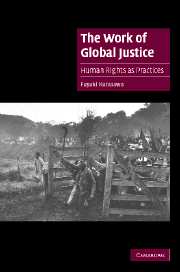Book contents
- Frontmatter
- Contents
- List of figures
- Preface
- Introduction: Theorizing the work of global justice
- 1 A message in a bottle: on bearing witness
- 2 The healing of wounds: on forgiveness
- 3 Cautionary tales: on foresight
- 4 The stranger's keeper: on aid
- 5 Cosmopolitanism from below: on solidarity
- Conclusion: Enacting a critical cosmopolitanism
- References
- Index
- Cambridge Cultural Social Studies
2 - The healing of wounds: on forgiveness
Published online by Cambridge University Press: 01 December 2009
- Frontmatter
- Contents
- List of figures
- Preface
- Introduction: Theorizing the work of global justice
- 1 A message in a bottle: on bearing witness
- 2 The healing of wounds: on forgiveness
- 3 Cautionary tales: on foresight
- 4 The stranger's keeper: on aid
- 5 Cosmopolitanism from below: on solidarity
- Conclusion: Enacting a critical cosmopolitanism
- References
- Index
- Cambridge Cultural Social Studies
Summary
Thus forgiveness is as strong as cruelty; but it is not stronger than the latter.
(Jankélévitch 1998 [1967]: 1149)Introduction
To write about forgiveness in an age of injustice and vengeance is far from obvious. The mirroring rhetoric emanating from global terrorism and the ‘war on terror’ would seem to indicate that the ‘settling of scores’ with those designated as enemies is an overwhelming force of political discourse and action today. According to many political leaders and their followers, to forgive is at best a sign of weakness equivalent to capitulation to or appeasement of foes, and at worse is tantamount to aiding and abetting the latter. At this historical juncture, then, it is all too easy or convenient to disregard the possibility that forgiveness represents a mode of practice of global justice that can assist actors to work through some of the most egregious manifestations of mass human rights violations in recent memory.
Indeed, over the last decade or so, states and international organizations have increasingly fostered the institutionalization of official mechanisms of forgiveness in societies emerging from situations of structural violence and pervasive abuses of civil-political rights.
- Type
- Chapter
- Information
- The Work of Global JusticeHuman Rights as Practices, pp. 56 - 93Publisher: Cambridge University PressPrint publication year: 2007

